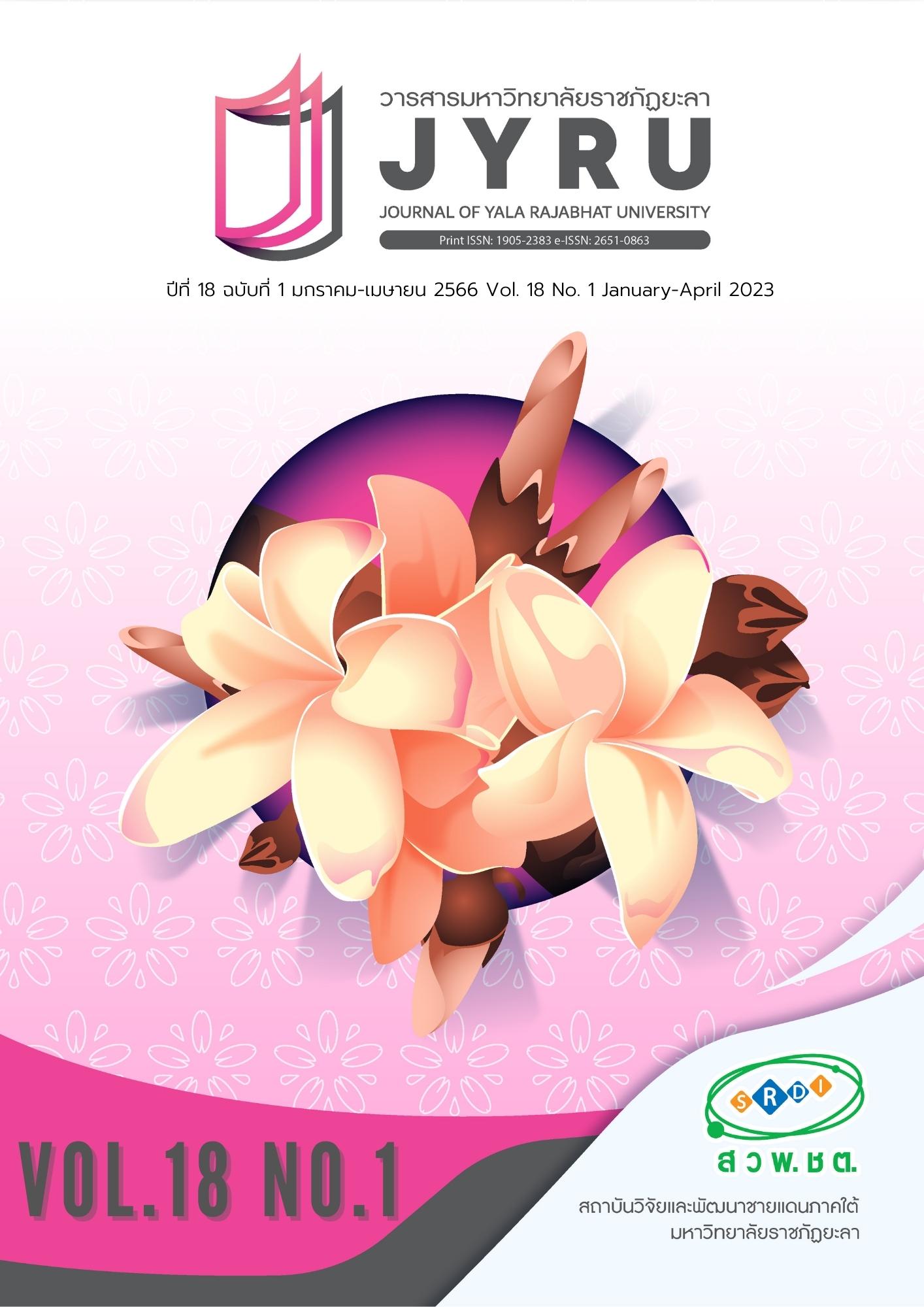การสกัดประสบการณ์และสร้างความรู้ใหม่โดยผู้ให้บริการทางการท่องเที่ยว เพื่อตอบสนองต่อความต้องการและพฤติกรรมของนักท่องเที่ยวชาวจีน : กรณีศึกษาในจังหวัดเชียงใหม่ ประเทศไทย
Main Article Content
บทคัดย่อ
การวิจัยนี้ได้ศึกษากระบวนการสร้างความรู้และพัฒนากิจกรรมการสร้างความรู้แก่ผู้ให้บริการด้านการท่องเที่ยว เพื่อให้ได้ความรู้ใหม่ที่ตอบสนองต่อความต้องการและพฤติกรรมของนักท่องเที่ยวชาวจีนในอำเภอเมือง จังหวัดเชียงใหม่ ประชากรคือผู้เกี่ยวข้องกับการท่องเที่ยวในพื้นที่ประกอบด้วยผู้เชี่ยวชาญด้านความรู้ ผู้จัดการความรู้ และผู้ใช้ความรู้ในการปฏิบัติงาน ดำเนินการรวบรวมข้อมูลด้วยการอภิปรายกลุ่ม การสัมภาษณ์เชิงลึก และการวิเคราะห์ข้อมูลด้วยรูปแบบการสร้างความรู้ SECI เพื่อให้กลุ่มตัวอย่างแบ่งปันความรู้และประสบการณ์ร่วมกัน แล้ววิเคราะห์และสังเคราะห์ความรู้จากผู้เชี่ยวชาญและผู้จัดการความรู้ และนำไปผสานกับความรู้ฝังลึกของผู้ให้บริการทางการท่องเที่ยวเพื่อให้เกิดแนวทางปฏิบัติงานที่ดีขึ้น ผลของการวิจัยพบว่าผู้ให้บริการทางการท่องเที่ยวสามารถสร้างความรู้ผ่านกิจกรรมตามกระบวนการและสามารถรวบรวมเป็นคู่มือการปฏิบัติงาน ในด้านต่าง ๆ ได้แก่ ความรู้ในการปฏิบัติงานด้านการต้อนรับและทักทาย การเสนอความช่วยเหลือหรือบริการ แนวทางการปฏิบัติขณะให้บริการ ลักษณะนิสัยของนักท่องเที่ยวชาวจีน ความรู้ที่จำเป็นในการให้บริการด้านการท่องเที่ยว คุณสมบัติที่จำเป็นสำหรับบริการการท่องเที่ยว ข้อควรระวังในการให้บริการแก่นักท่องเที่ยวชาวจีน แนวปฏิบัติเพื่อความเป็นเลิศในการให้บริการนักท่องเที่ยวชาวจีน เคล็ดลับในการให้บริการนักท่องเที่ยวชาวจีนให้ประทับใจ เมื่อนำความรู้จากคู่มือการปฏิบัติงานไปใช้พบว่า ผู้ให้บริการด้านการท่องเที่ยวสามารถปฏิบัติงานเพื่อตอบสนองความต้องการและพฤติกรรมของนักท่องเที่ยวชาวจีนได้อย่างถูกต้อง ครบถ้วนและมั่นใจ
Article Details

อนุญาตภายใต้เงื่อนไข Creative Commons Attribution-NonCommercial-NoDerivatives 4.0 International License.
บทความ ข้อมูล เนื้อหา รูปภาพ ฯลฯ ที่ได้รับการเผยแพร่ในวารสารมหาวิทยาลัยราชภัฏยะลานี้ ถือเป็นลิขสิทธิ์ของวารสารมหาวิทยาลัยราชภัฏยะลา หากบุคคลหรือหน่วยงานใดต้องการนำทั้งหมดหรือส่วนหนึ่งส่วนใดไปเผยแพร่ต่อหรือกระทำการใดๆ จะต้องได้รับอนุญาตเป็นลายลักษณ์อักษรจากวารสารมหาวิทยาลัยราชภัฏยะลาก่อนเท่านั้น
เอกสารอ้างอิง
Auttarat, S. & Poonsukcharoen, N. (2021). Factors supporting sustainable long-stay residential city: Chiang Mai's guidelines to develop sustainable long-stay residential cities. Chiangmai: Chiangmai University. (in Thai)
Bandurat, P. & Wongmontha, S. (2020). Chinese tourist’s satisfaction toward the spa business in Thailand. Rajapark Journal, 14(35), 92-103. (in Thai)
Chansukree, P., Phansaita, N., Chuayok, P & Rungjindarat, N. (2017). Knowledge management in creative tourism: a case study of the Amphawa community in Samut Songkhram province. Journal of Dusit Thani College, 11(3), 49-63. (in Thai)
Choibamroong, T. (2017). Expectations and satisfaction of Chinese tourists toward Thailand tourism management. Asia-Pacific Social Science Review, 16(3), 30–45.
Nonaka, I., & Takeuchi, H. (1995). The knowledge creating company: How Japanese companies create the dynamics of innovation. New York: Oxford University Press.
Pongjam, K. (2019). Development of training course in scoop for newly recruited news Anchor of channel 7 television by using SECI model. Master’s thesis of science in knowledge management, Chiang Mai University. (in Thai)
Rabob, C., Moryadee, C., Tarakham, P. & Kraisamrong, A. (2019). Attitude of service provider in tourism industry supply chain toward the positive behavior to encourage guideline of Chinese tourists in Thailand. Business Review, 11(1), 213-230. (in Thai)
Sangkakorn, K. (2013). Modern Chinese tourists behavior in Chiang Mai after the movie ‘Lost in Thailand’. The Second Sino–Thai Strategic Research Seminar 2013, October 17-22, 2013. Xiamen: China.
Sangkakorn, K. Maneetrakunthong, A. & Jeerat, K. (2016). Expectations and satisfaction of Chinese tourists in Thailand after the ‘Lost in Thailand’ movie fever. Chiangmai: Chiangmai University. (in Thai)
Sangkakorn, K., Boonyanupong, S., Yanachinda, J., Uthongsap, K., Thanalertsophit, P., Jing, F., et al. (2017). Study on Chinese tourists market toward Thai tourism industries. Bangkok: Thailand Research Fund. (in Thai)
Thailand’s Ministry of Tourism and Sports. (2019). Tourism statistics 2019. [Online]. Retrieved May 1, 2020, from: https://mots.go.th/more_news_new.php?cid=521. (in Thai)
Torres, E.N. (2016). Guest interactions and the formation of memorable experiences: an ethnography. International Journal of Contemporary Hospitality Management, 28(10), 2132-2155.
Untong, A. (2018). Classification features of Chiang Mai tourism based on the satisfaction structure of the Chinese independent travelers. Applied Economics Journal, 25(2), 34-54.
Zhang, L., & Li, W. B. (2008). Study on the SECI model for the design of tourism products: a case study of Guazhou County in Gansu province. Journal of Huaihai Institute of Technology (Social Sciences Edition), 6(2), 69-72.


